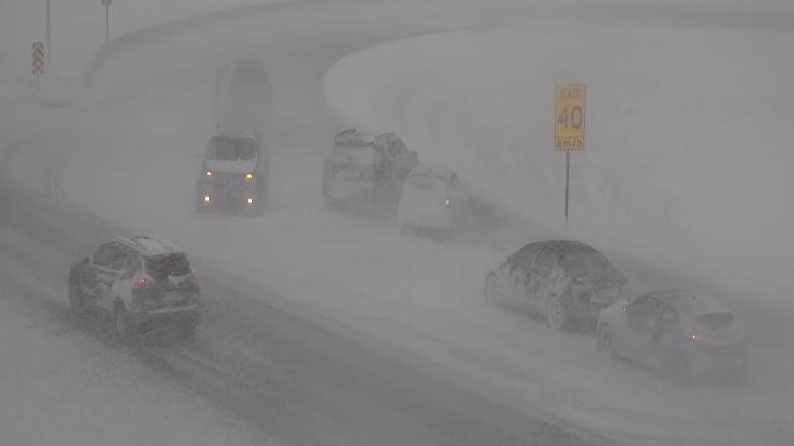Calgary’s top 5 stories of 2019
Posted Dec 27, 2019 8:00 am.
Last Updated Dec 27, 2019 3:46 pm.
CALGARY – As the year comes to a close and we review all 2019 had to offer, we’re taking a look at which stories resonated most with our readers.
We took a look at analytics over the last year and compiled a list of the stories that were most popular.
Here’s a list of our most-read stories of 2019!
1. OPINION: People who whined about the Amber Alert are horrible people

“You are horrible people. I mean that. I am not being facetious or wry. You are not good people,” read an opinion piece from Maclean’s magazine.
The article popped up after an Amber Alert was sent out across Ontario following a parental abduction in Brampton. The emergency alert buzzed and sounded alarms on TV, radios, and cell phones late at night, waking many.
The body of 11-year-old Riya Rajkumar was found at a home in Brampton shortly after an Amber Alert was issued following her disappearance. The girl’s father, 41-year-old Roopesh Rajkumar, was charged with first-degree murder in her death. He was later found with a self-inflicted gunshot wound and he did not survive.
But the morning following the alert, social media was abuzz with complaints regarding the loud notification.
READ MORE:
Don’t call 911 to complain about being awakened by Amber Alert: Police
‘Please no more alerts’: people complain about Amber Alert, again
Albertans react to latest Amber Alert
“The most common complaint is that they were too far away from the point of the crime to do anything. A woman whose tweet has since been deleted was angry about a second message to say the alert was now cancelled, believing it unnecessary. Others complained bitterly: “We do not work for [the police],” one man wrote. Some even called 911, not to provide tips, but to criticize the alert,” continued the article.
“That is what citizens are complaining about today. They were asked to help save a child and this irritated them…If you want to live in a province that protects its children, occasionally you have to roll over in bed and check your phone. And if that is too much to ask, then you are objectively a horrible person.”
2. Snowfall warning in effect for Banff, Canmore and Kananaskis

Now, snow in the mountains might not be a real surprise and you might be thinking–this is the second story of the year?
It sure was–because this particular snowfall warning was issued at the beginning of June. Environment Canada was calling for up to 10 centimetres, with Banff and northern parts of Kananaskis expected to receive the highest snowfall amounts.
As with any snowstorms outside of the winter months, the weather agency warned there was a chance that heavy, wet snow could cause tree branches to break as well as affecting people camping and travelling through the mountain parks regions. Calgary saw that very situation come to life a few years ago.
Environment Canada warned drivers to prepare for changing road conditions as highways and roads may become difficult to navigate with the snow accumulation.
3. Makers of Zantac stopping distribution due to cancer concerns

This past September, the maker of the popular heartburn medication said it was halting distribution amid concerns of a cancer-causing chemical.
Sandoz, the makers of Zantac made the decision days after regulators in the U.S. and Europe found NDMA, a known carcinogen, in the medications.
The chemical was found in brand name and generic forms of Zantac, which the key ingredient is Ranitidine. The company also issued a recall for Canada for Sandoz Ranitidine 150 mg tablet and the 300 mg tablet.
Health Canada is also asking all companies to stop distribution of the medicine.
4. Jane Philpott tells Maclean’s: ‘There’s much more to the story’

Jane Philpott resigned from cabinet on Mar. 4 following the SNC-Lavalin fallout.
The then-Liberal-MP for the Ontario riding of Markham-Stouffville was one of two women whose government roles changed dramatically as a result of the scandal–Jody Wilson-Raybould was removed from caucus with Phillpot and lost her coveted justice portfolio when Prime Minister Justin Trudeau shuffled cabinet.
READ MORE:
Trudeau repeats non-apology for ‘standing up for jobs’ in SNC-Lavalin affair
Trudeau broke law by kicking former ministers out of caucus, Philpott says
Trudeau should apologize for violation of ethics code: Philpott
Philpott sat down with Maclean’s for her first interview following her resignation later in March, and told the magazine she believed that “there’s much more to the story that needs to be told” but that it couldn’t come out because “there’s been an attempt to shut down the story” — an attempt she attributed to Trudeau and his close advisors.
“I believe we actually owe it to Canadians as politicians to ensure that they have the truth. They need to have confidence in the very basic constitutional principle of the independence of the justice system,” she said.
5. Upset about the rainbow poppy? You’ve been duped by fake news
Posts online were stirring up outrage, suggesting the LGBTQ+ community is pushing an alternative to the traditional poppy. The original, red poppy, worn to commemorate veterans in the lead-up to Remembrance Day, appears to be redone, with each petal a different colour.
But claims the new poppy is widespread turned out to be false.
There were posts indicating an artist once sold them online, and the photo of that poppy, an enamel rainbow pin that has since been taken down, appears to have been used in every post decrying the LGBTQ+ community co-opting Remembrance Day.
But there is no mainstream movement among the LGBTQ+ community to use them, the poppies are not mass-produced and are not even available to buy in Canada.
RELATED:
Don Cherry facing backlash over poppy comments
Digital poppies are back
Poppies from the First World War tour country as symbol of hope, resilience
Social media expert Susie Parker says people need to be more critical about what they read and share online.
“If I couldn’t explain to somebody else in plain, clear language what happened, maybe I shouldn’t be sharing that content, or even consuming it myself,” she said.
And Ryerson journalism professor Marsha Barber says people are too trusting of what they see on Facebook and Twitter.
“You see that your friends are concerned in sharing these posts, so, unfortunately, it gives these posts a kind of heightened credibility, but it’s so important that people think critically,” she said.
“People tend to trust online media posts, wrongly and unfortunately, because their friends share them. You see these posts on Facebook, you see them in intimate settings.”
For more on how the entire ordeal came about, click here.










